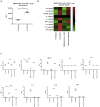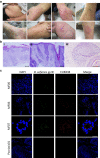Malignant T Cell Activation by a Bacillus Species Isolated from Cutaneous T-Cell Lymphoma Lesions
- PMID: 35199089
- PMCID: PMC8844718
- DOI: 10.1016/j.xjidi.2021.100084
Malignant T Cell Activation by a Bacillus Species Isolated from Cutaneous T-Cell Lymphoma Lesions
Abstract
Cutaneous T-cell lymphoma (CTCL) is a life-debilitating malignancy of lymphocytes homing to the skin. Although CTCL is thought to arise from a combination of genetic, epigenetic, and environmental factors, specific triggers are unclear. The skin is colonized by a unique microbiota and is heavily influenced by its interactions. We hypothesized that adaptive immune responses to skin commensals lead to clonal T-cell proliferation and transformation in the appropriate genetic background. We therefore collected lesional and nonlesional skin microbiota from patients with CTCL to study T cell interactions using skin T cell explants and peripheral, skin-homing CD4+ T cells. By various methods, we identified Bacillus safensis in CTCL lesions, a rare human commensal in healthy skin, and showed that it can induce malignant T cell activation and cytokine secretion. Taken together, our data suggest microbial triggers in the skin microbiota of patients with CTCL as potential instigators of tumorigenesis.
Keywords: ASV, amplicon sequence variant; CLA, cutaneous lymphocyte‒associated antigen; CTCL, cutaneous T-cell lymphoma; MF, mycosis fungoides; STAT3, signal transducer and activator of transcription 3; rRNA, ribosomal RNA.
© 2021 The Authors.
Figures










References
-
- Branquinho R., Meirinhos-Soares L., Carriço J.A., Pintado M., Peixe L.V. Phylogenetic and clonality analysis of Bacillus pumilus isolates uncovered a highly heterogeneous population of different closely related species and clones. FEMS Microbiol Ecol. 2014;90:689–698. - PubMed
Grants and funding
LinkOut - more resources
Full Text Sources
Molecular Biology Databases
Research Materials
Miscellaneous

